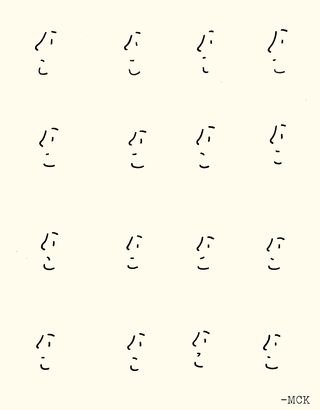Depression
Effective Up and Down the Line
New research finds medication helpful in mild and moderate depression
Posted November 4, 2016

In 2010, JAMA published a paper that arrived at a striking conclusion: Antidepressants are effective only for severe depression. For mild and moderate depression, the drugs are no better than dummy pills. The research was headline news—and its conclusion, that for most patients the lift from antidepressants is “all in their heads” (to echo the report in USA Today) became commonplace.
It followed that most doctors' clinical impression, that medication works especially well in mid-range mood disorder, was simply mistaken—a case of their being unaware of the power of their own charisma, the influence of the medical setting, and the suggestibility of depressed patients.
But the JAMA study was small. It reviewed only six trials involving just over seven hundred patients, and it had lots of peculiarities. Some participants had been on especially low doses of antidepressants. And for technical reasons, the patients with low-level depression who were most responsive to drugs had been excluded. It was unclear whether the pattern that emerged, less efficacy in lesser forms of depression, reflected limitations of the medicine or inconsistencies in diagnosis and dosing.
The media's—and the profession's—willingness to overturn clinical observation (and patients' own impressions) on the basis of such shaky research is testament to the cultural preference for seeing depression as a "merely psychological" rather than fully medical disorder.
If the the JAMA paper had a particular strength, it was that the researchers had analyzed the data patient by patient. Prior research had looked at outcomes for groups of patients. In a cohort of one or two hundred participants with severe depression, what is the average advantage of drug over placebo? It was the summary number for each group that constituted a data point on a graph—and that very approximate approach can hide trends or make false ones appear.
To know for certain whether antidepressants work better for severe depression, and less well in mild or moderate cases, we would want researchers to take a large collection of studies, performed with reasonably uniform methodology, and extract and analyze the outcome for each patient.
The current issue of the British Journal of Psychiatry contains that work. A team from Israel, England, France, and the U. S., working under the auspices of a European Union program with contributions from Pharma, applied a patient-by-patient approach to complete sets of drug company data for five medications, including Zoloft and Lexapro. Examining 34 trials involving well over ten thousand patients, the international group found uniform advantages for antidepressant (over placebo) up and down the line.
Ideally, we might want to see other groups of academics, with no ties to drug companies, gain access to the same data and re-run the analyses. But for now the British Journal of Psychiatry study contains our most convincing insight into the range of action of antidepressants. As doctors and patients had long understood, antidepressants work across the full spectrum of major depression. (Based on other, less comprehensive studies, I came to that same conclusion in my recent book, Ordinarily Well.)
The JAMA analysis, small and quirky, received widespread coverage in the press. So far, the British Journal of Psychiatry study has gotten none. But if the suggestion that drugs work only in severe depression is news, so is the corrective, the finding, based on much more extensive data, that antidepressants work equally well for mild and moderate major depression. For a wide range of patients, their relief from depression is not in their heads only, but in their brains as well, based on the inherent efficacy of the medication they are taking.


